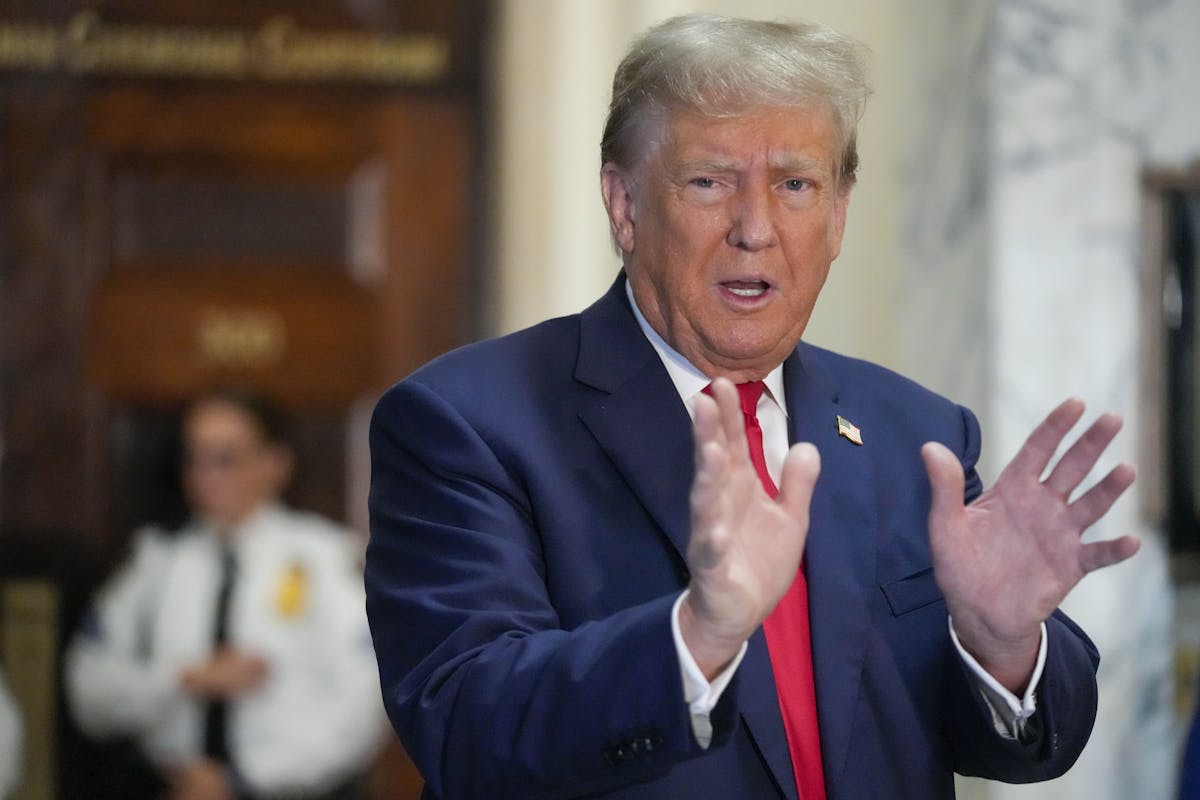Jack Smith Rings in New Year by Asserting That Trump Threatens the ‘Constitutional Foundations of Our Republic’
The special prosecutor argues that the Founding Fathers would ‘never have countenanced’ constitutional immunities as broad as those being claimed by the 45th president.

Special Counsel Jack Smith’s argument that President Trump is a danger to the American republic, made in an appellate filing hours before the new year, could be destined for the Supreme Court — and the ballot box — in 2024.
The special counsel reckons that the “Founders did not intend and would never have countenanced” the expansive vision of presidential immunity propounded by Mr. Trump. Both the prosecutor and the 45th president are making their cases to the United States appeals court for the District of Columbia circuit.
Rising to high rhetorical dudgeon, Mr. Smith declares that Mr. Trump’s invocation of the protections of the office he once held “threatens the democratic and constitutional foundation of our Republic.” This high prosecutorial pitch underscores the central role that the immunity question has attained in the prosecution of Mr. Trump for alleged efforts to overturn the 2020 election.
The brief to three circuit riders — Karen Henderson, Florence Pan, and Michelle Childs — affords Mr. Smith the opportunity to reprise his core contention , namely that Mr. Trump “conspired to use knowingly false claims of election fraud with the goal of overturning the legitimate results” of the last election and “disenfranchising millions of voters.”
While Mr. Smith allows that presidents are shielded from civil liability for their official conduct, he maintains that “any burdens of post Presidency criminal liability have minimal impact on the functions of an incumbent and are outweighed by the paramount public interest in upholding the rule of law through federal prosecution.”
The special counsel also rejects Mr. Trump’s contention that conviction at impeachment is a “a condition precedent to criminal prosecution.” The 45th president contends that the Constitution’s Impeachment Judgment Clause ordains that an acquittal by the Senate — like the one that discovered that Mr. Trump was in fact not guilty of inciting an insurrection on January 6 — precludes further prosecution for the same underlying acts.
If, as Mr. Smith argues the Constitution “does not create a double-jeopardy prohibition that protects an impeached but not convicted officer from criminal prosecution,” then Mr. Trump’s acquittal — on a single charge of incitement to insurrection — does not preclude the special counsel’s case which, while not charging insurrection, alleges criminal conspiracies for the same acts.
Mr. Smith writes that not only are Mr. Trump’s expansive views on immunity wrong, but that they “threaten to undermine democracy” and “draw no support from our constitutional heritage and, if accepted, would damage bedrock principles of equality before the law.” Much the same conclusion was reached by the district court judge, Tanya Chutkan.
The special counsel allows that the president “stands alone in the constitutional firmament,” but that “once out of office, a former President may face federal criminal prosecution like any other citizen.” This point was made by one of President Clinton’s lawyers, Nicole Seligman, during his trial in the Senate, where she argued, in a famous defense, that if the Senate acquitted the 42nd president (as it did), he could always be pursued in criminal court after his presidency.
“The often repeated statement that no man — or woman, I should add — is above the law is, of course, true,” Ms. Seligman told the Senate hearing the Clinton impeachment. “Once he leaves office, the President is as amenable to the law as any citizen, including for private conduct during his term of office.”
For his part, Mr. Smith acknowledges that a state prosecution — like those faced by Mr. Trump in New York and Georgia — would raise “separate questions under the Constitution’s Supremacy Clause.”
While Mr. Trump argues that cutting away at immunity would impair what Justice Antonin Scalia, in a case about the constitutionality of an independent counsel, called the “boldness of the President,” Mr. Smith asserts that the “prospect of future criminal prosecution for knowingly criminal acts can have a salutary, not a chilling, effect.”
Mr. Smith cites the “rigorous standards to prove criminal offenses and evidentiary limitations that would come into play” with the prosecution of a president like Mr. Trump. “A scheme to thwart the peaceful transfer of power,” Mr. Smith adds, “contradicts the most basic constitutional check on executive abuses.”
That check, Mr. Smith proposes, comes not merely from impeachment — the Framers, he notes, decided against Congress being able to impose the same sanctions that Parliament is capable of levying — but also from the threat of criminal prosecution after the president leaves office and he reverts to being, as Ms. Seligman noted, a citizen like any other.

